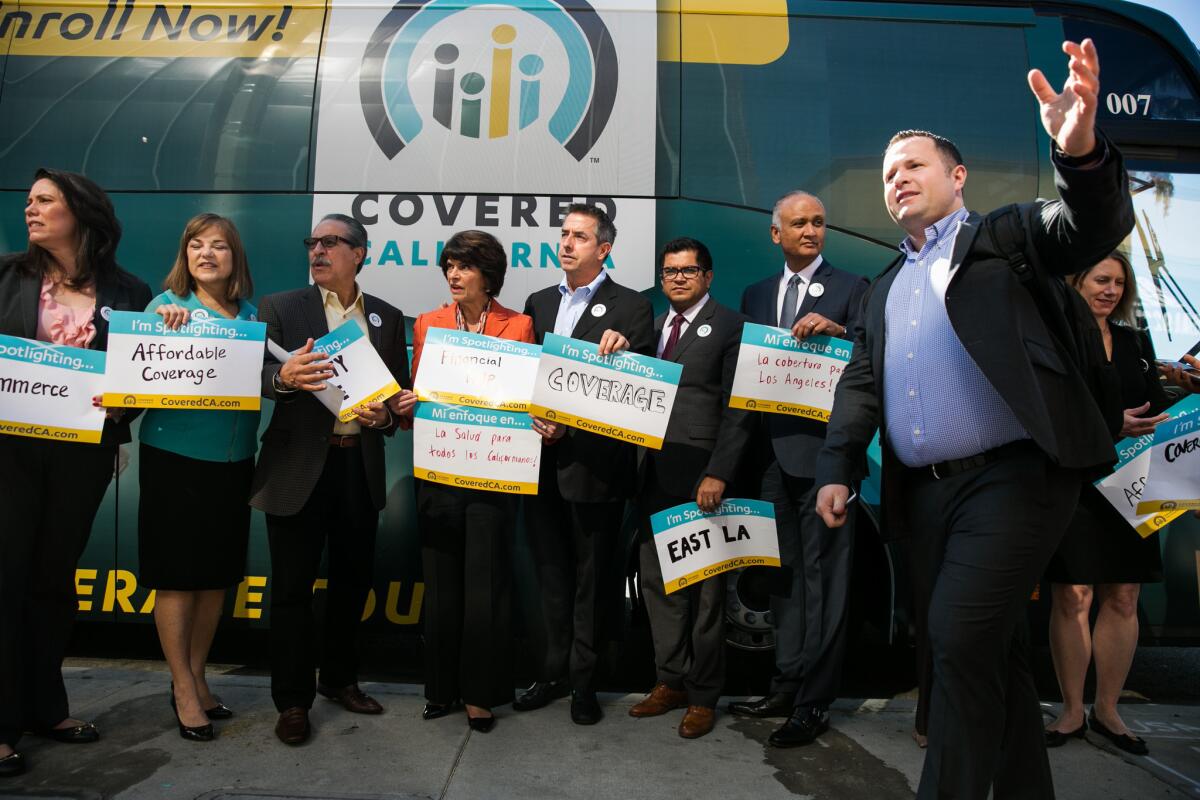Obamacare enrollment is expected to grow by just 1 million next year

- Share via
Reporting from Washington — Under pressure to stabilize wobbly insurance markets nationwide, the Obama administration is making a new push to sign up Americans for health coverage through the Affordable Care Act, aiming to increase enrollment by about 1 million in 2017.
With insurers canceling health plans or raising premiums by double digits in many parts of the country, that represents only modest enrollment growth over 2016.
And it means that next year, average enrollment on HealthCare.gov and other state-run insurance marketplaces such as Covered California will be about 11.4 million, according to projections from the Department of Health and Human Services. That compares with 10.5 million this year.
The enrollment tally fluctuates through the year as people join plans and drop them; the tally is usually highest at the beginning of the year and then declines by the end of the year.
“Building a new market is never easy,” Health and Human Services Secretary Sylvia M. Burwell said Wednesday in remarks at the agency.
“And as I’ve said before, we expect this to be a transition period for the marketplace. Issuers are adjusting their prices, bringing them in line with actual data on their costs. And at HHS, we’re enhancing the stability of the marketplace, and making it stronger for the future.”
But Burwell renewed calls on Congress to help make adjustments to the law to make the marketplaces more sustainable.
Open enrollment on insurance marketplaces created by the law begins Nov. 1 and runs through January.
The enrollment period, the fourth since the law’s coverage expansion began, comes at a critical moment for the marketplaces and the health law that President Obama signed in 2010.
The coverage expansion has recorded historic gains over the last three years, as some 20 million previously uninsured Americans gained health insurance and the nation’s uninsured rate dropped to the lowest level ever recorded.
At the same time, healthcare costs have been rising at historically low levels.
This year, for example, the annual family premiums for employer-sponsored health insurance — which some 150 million Americans rely on — rose an average of just 3%, according to an annual survey by the nonprofit Kaiser Family Foundation and the Health Research & Educational Trust.
And since 2011, premiums have increase just 20%, far lower than in the previous five years, when they jumped 31%, and even lower than in the five years between 2001 and 2006, when they shot up 63%.
Medicare has seen a similar slowdown, as the cost per enrollee has grown by an average of just 1.4% annually since 2011, according to the program’s trustees. That was the lowest growth rate in Medicare’s history, dating back to 1965.
But the health insurance marketplaces — an important pillar of the law — have proven more challenging to establish than their architects envisioned.
In 2017, enrollment is expected to grow only 9%.
This year, several dozen insurers have either pulled back from the marketplaces or shuttered completely, citing unsustainable losses from covering patients who were much sicker than they anticipated.
Those that remain in the marketplaces for 2017 in many cases are seeking large rate hikes.
That has strained many consumers, even in states like California that have been more successful in building functioning marketplaces.
Though most Californians will have multiple insurance choices for 2017, a substantial number of 2016 customers are facing very large rate hikes unless they switch health plans.
Federal health officials note that subsidies available through the law should protect most consumers from the rate hikes.
Consumers making less than four times the federal poverty level — about $47,000 for a single adult or $97,000 for a family of four — qualify for subsidies.
Insurers must provide a basic set of benefits and cannot turn away consumers, even if they are sick.
But many insurers and state regulators have been urging adjustments to the health law to speed enrollment growth and bring in younger, healthier customers
“The time is long past due for state and federal policymakers to move past the politics and come together and make substantive corrections to the law,” Maryland Insurance Commissioner Al Redmer Jr. told a House committee last month.
“The markets are suffering. Let’s roll up our sleeves and fix them,” he said.
According to a recent analysis by the nonprofit Kaiser Family Foundation, more than 5 million people who are currently uninsured could get federal subsidies to buy coverage. Other research has suggested that many of these people do not know they can get the aid.
More challenging to reach will likely be Americans who make too much to qualify for assistance.
The White House last month announced a new effort to use social media and other tools to convince more younger Americans to sign up for health plans.
Younger consumers are viewed as critical to sustaining the marketplaces because they are typically healthier and less costly to insure.
Administration officials have taken several additional steps to make shopping for health plans more appealing to consumers as well, including allowing Americans to more easily compare plans.
New plan designs being debuted this year will also allow consumers to get a health plan that exempts some physician visits from deductibles, a step that California and several other states have already taken to draw in healthier customers who may be reluctant to pay for a health plan that doesn’t offer any coverage until they pay thousands of dollars out of pocket.
Twitter: @noamlevey
ALSO
Obamacare patients filled more prescriptions but paid less for drugs, study finds
More to Read
Sign up for Essential California
The most important California stories and recommendations in your inbox every morning.
You may occasionally receive promotional content from the Los Angeles Times.











